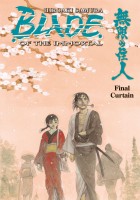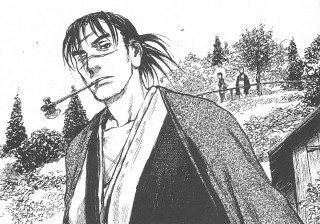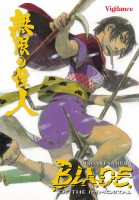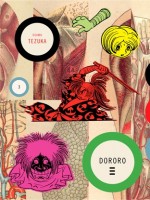 Creator: Hiroaki Samura
Creator: Hiroaki Samura
U.S. publisher: Dark Horse
ISBN: 9781616556266
Released: April 2015
Original release: 2013
Awards: Eisner Award, Japan Media Arts Award
So, this is it. The Final Curtain of Blade of the Immortal, both literally and figuratively. Released by Dark Horse Comics in 2015, the volume is the thirty-first and final installment in the English-language edition of Hiroaki Samura’s epic manga series. After nearly two decades of publication, the entirety Blade of the Immortal has now been translated. Due to slight differences between the early English trade collections and the Japanese releases, Final Curtain is actually equivalent to the thirtieth volume of the original Japanese edition of Blade of the Immortal published in 2013. The manga has been well-received by both critics and fans alike, winning Samura many awards and honors including a Japan Media Arts Award and an Eisner Award. Blade of the Immortal was one of the very first manga that I began reading and collecting and the series has remained a personal favorite of mine ever since I discovered it. Because of that, Blade of the Immortal and its ending hold particular meaning for me. I have been looking forward to reading its conclusion for a very long time.
At its height, the Ittō-ryū was poised to become the official sword school of the shogunate, bringing the goal of the group’s leader Anotsu Kagehisa—the restoration of the way of the sword to Japan—tantalizingly close. But in the end they were betrayed and massacred by the very people who invited them to join the banshū. Since then the Ittō-ryū’s numbers have continued to dwindle as the survivors of that initial attack have been hunted down by the Mugai-ryū and Rokki-dan, forces largely made up of death row criminals commanded by Habaki Kagimura. The fighting has been fierce and casualties have been immense on both sides. Now only a few members of each group remain and they are locked in their final battles against one another. Though it appears as though Anotsu may have the upper hand, the outcome of the conflict is far from certain, especially as there are others interested in controlling the fate of the Ittō-ryū, including the young woman Rin and her near-immortal bodyguard Manji.
 Final Curtain serves two main purposes: providing a resolution to the intense and bloody confrontations begun in the previous volume, Vigilance, and granting a conclusion to Blade of the Immortal as a whole. I feel the final volume is successful on both counts. Even though they aren’t as over-the-top or as brutal as some of the other fight sequences in the series, there are still plenty of surprises to be had in the final battles of Blade of the Immortal. They require incredible physical, mental, and even emotional fortitude from those involved, making the scenes very engaging to read. It’s not just fighting for fighting’s sake; there is deliberate purpose and reason behind the struggles. Lately, the series seems to have turned its attention to the dramatic demise of the Ittō-ryū and its leader, but Final Curtain manages to bring the manga full circle again by allowing Rin and Manji to once again become directly involved in how events unfold.
Final Curtain serves two main purposes: providing a resolution to the intense and bloody confrontations begun in the previous volume, Vigilance, and granting a conclusion to Blade of the Immortal as a whole. I feel the final volume is successful on both counts. Even though they aren’t as over-the-top or as brutal as some of the other fight sequences in the series, there are still plenty of surprises to be had in the final battles of Blade of the Immortal. They require incredible physical, mental, and even emotional fortitude from those involved, making the scenes very engaging to read. It’s not just fighting for fighting’s sake; there is deliberate purpose and reason behind the struggles. Lately, the series seems to have turned its attention to the dramatic demise of the Ittō-ryū and its leader, but Final Curtain manages to bring the manga full circle again by allowing Rin and Manji to once again become directly involved in how events unfold.
Blade of the Immortal has always had a large cast of characters as well as several intertwining plot threads. All of the survivors and the families and friends of those who have died have at least one moment in Final Curtain, even if it’s only a few panels, in which they become the focus of the manga, creating something akin to an epilogue. Loose ends are tied up and, while some ambiguity remains, the aftermath of the long struggle is revealed. Blade of the Immortal covered a lot of ground in its thirty-one volumes, the story twisting and turning and the characters and their relationships continually growing and evolving. The series can be read and enjoyed simply for its impressive action and fight sequences, but the manga also explores deeper, thought-provoking ideas. The characters are morally complex—very few can be said to be entirely in the right or in the wrong—and Blade of the Immortal questions what their or any person’s ultimate legacy will be. As for the last volume itself, I found Final Curtain to be a very satisfying conclusion to the series.




